Tag : chanukah
January 26, 2021 by admin
This Holiday Celebrates Girls!
The 7th Night of Chanukah, on Rosh Chodesh Tevet, we celebrate Chag haBanot (Eid al-Banat in Arabic), a North African Jewish Festival of the Daughters. This holiday elevates women’s power— the strength, wisdom and resilience of women throughout the ages. Women, young and elderly, would gather for a celebration together to delight in sweets, sing prayers, dance, and give gifts to each other, particularly gold coins
and jewelry.
The holiday is associated with bold, wise, courageous and determined women.
- No Comments
December 16, 2020 by admin
This Hanukkah, Illuminating the Power of Feminists
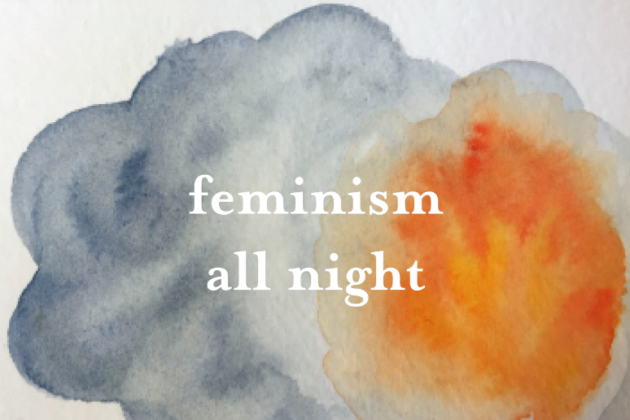
Four years ago, I sat in a communal Shavuot learning program. I recall thinking to myself, what is the Torah that the Jewish people need right now? The answer became crystal clear: it is feminism.
The next year, I decided to experiment and organize an event called Feminism All Night. The vision was inspired by the Jewish holiday of Shavuot and brought feminist thinkers together to teach and learn communally about feminism. The success was overwhelming, with over 100+ attendees and over 12 sessions that had us staying until 4 AM.
Since then, I have been cultivating this project by designing immersive feminist communal learning experiences centered on Jewish holidays. We hosted Feminism All Day for the holiday of Sukkot and expanded our events from Oakland to various cities, including Boston and Tel Aviv. Our community has grown to over 1500 people!
This year we decided to bring our vision of feminist Jewish learning to Chanukah. On the 7th Night of Chanukah on Rosh Chodesh Tevet is the traditional celebration of Chag haBanot (Eid al-Banat in Arabic), a North African Jewish Festival of the Daughters. The holiday elevates women’s power–the strength, wisdom and resilience of women throughout the ages. Women, young and elderly, would gather for a celebration together to delight in sweets, sing prayers, dance, and give gifts to each other, particularly gold coins and jewelry.
The holiday is associated with legendary and midrashic traditions or literary and historical traditions, about bold, wise, courageous and determined women who saved their people with their resourcefulness, wisdom, courageous hearts and heroism, and changed historical circumstances in antiquity.
Chag haBanot elevates the heroism and resourcefulness of brave, bold and wise women, such as Queen Esther, Judith daughter of Merari, or Hannah [sometimes Miriam], daughter of Matityahu. In times of danger to their people, they gathered courage, devotion, strength and resourcefulness, and acted in extraordinary ways that are recorded in the chronicles and told by the women on The Festival of the Daughters.
Feminism All Night is committed to creating space for feminist learning and particularly uplifting Mizrahi traditions in the Jewish world. Our programming has centered Mizrahi feminist educators from the beginning. We love celebrating the sacred traditions and teachings of Mizrahi communities and bringing them forth to the wider community.
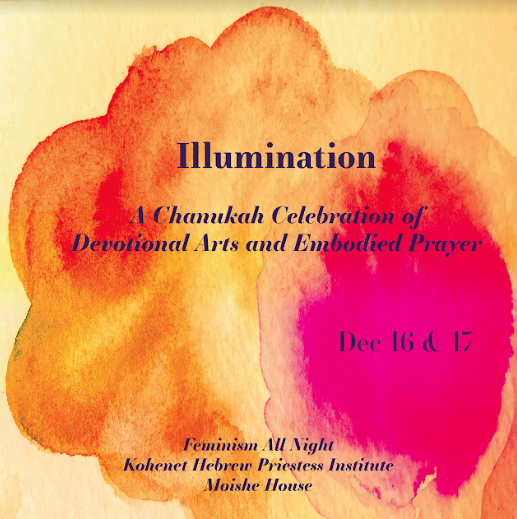
This year, on December 16th and 17th, we are hosting Illumination: A Chanukah Celebration of Devotional Arts and Embodied Prayer. Illumination is a collaboration between Hadar Cohen and Taya Mâ Shere. It is a partnership with Kohenet Hebrew Priestess Institute and is supported by Moishe House. The festival includes prayer, workshops and celebration. In honor of this celebration, we are featuring North African Jewish feminists–artists, teachers and spiritual leaders–on our Facebook and Instagram pages. Our programs are open to people of all genders and faiths and we invite you to join us–register here!
Some of our featured feminists include:
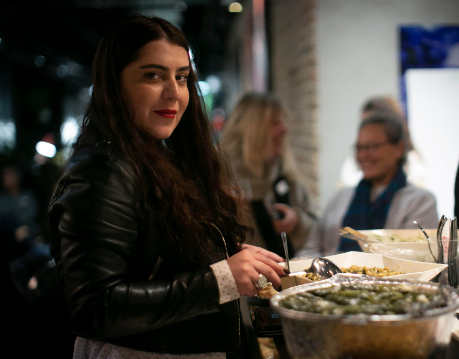
Sivan Tahel, a Moroccan activist and leader who was a lead organizer of Feminism All Night in Tel Aviv, January 2020, centered on Mizrahi Identity.
“Feminism is the mother of all struggles and everything connects to it. Feminism for me is solidarity, support networks of women, empowerment that is expressed in action, advancing other women and caring for their well-being, emotionally and financially. It is the ability to hear and listen to various strands of feminism, while respecting and embracing the diversity within the group of women. Feminism is the expansion of the feminist struggle with reference to power structures, ethnicity and status.”
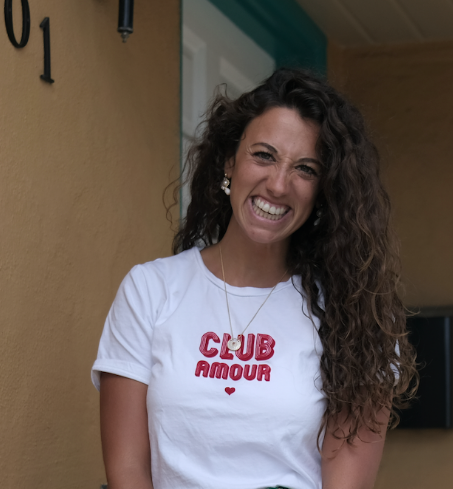
Nellie Alimi, a Tunisian and Algerian French artist who is working to preserve the North African rituals and traditions that she grew up with. Her family celebrated Eid Al Banat, and she will be sharing more about her familial lineage celebration at our Artistic Showcase.
“Feminism for me, is about elevating other women, showing a different type of leadership, embracing our own selves, not trying to fit into the white male model, speaking out truth, educating the world about strong women leaders and their challenges.”
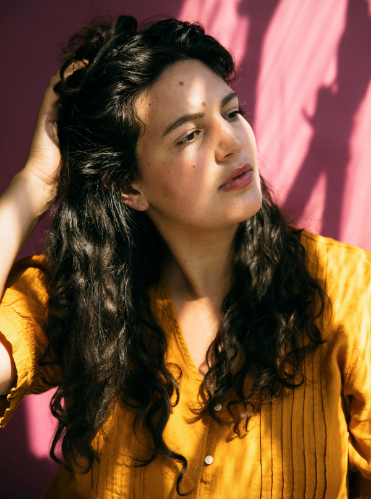
Daniela Labi, a Libyan feminist artist and community organizer. Daniela was one of the lead organizers for Feminism All Day 2019 in the Bay Area.
“To me, feminism means celebrating the true feminine power that lies within all of us. Feminism is the act of re-calibrating society so that we honor this power, lift it up, and use it to return to true alignment with g!d, the earth, and the universe. My mother was born and raised in Tripoli, Libya. She fled with her family in 1967, during the Six Day War, just months before she would’ve entered her last year of high school. For years, my ancestors lived in the deserts of Libya, and I feel the divine responsibility to capture their stories so that they are not lost to eurocentrism and whiteness.”
Hadar Cohen is a multimedia artist, educator and healer. She is the founder of Feminism All Night. To learn more about her work visit hadarcohen.me.
- No Comments
June 25, 2020 by admin
Uh oh! Babar Celebrates Christmas
Anne Frank’s soulful eyes stared straight out at me from the cover of her diary. The dust-jacket copy promised that it was a story of puberty, of adolescence and much more. Later, I looked these words up.
“Eight is too young for a book like this, choose a more appropriate book,” the temple librarian advised me. That librarian couldn’t fool me. She was trying to keep me away from the first real Jewish book I had ever seen.
Sometimes I lament the fact that most Jewish picture books seem locked into an idealized middle-class America with a bubbe who never leaves the kitchen. Too few books seem to reflect the way most American Jews live… and very few reflect contemporary issues or modern Israel.
There is always a moment, and I swear an audible sigh, when my children, collectively and individually realize that Babar, Madeline, Alfie, Annie Rose, all the American Girls, and many other of their favorite book characters celebrate Christmas. In honor of that moment, my new book (Fall ’97) is about a little girl named Meera who rides a trike, loves her blankie, and also celebrates Chanukah.
Michelle Edwards is the author/illustrator of many children’s hooks including: Eve and Smitty: An Iowa Tale, Alef-Bet and Chicken Man. She lives in St. Paul, Minnesota.
- No Comments
July 2, 2014 by admin
Can a Non-Jewish Spouse “Step Away” From Jewish Fears?
<< I’m lucky that I could step away from it if I wanted to. It’s no secret that Jews are still subject to racial prejudices and abuse – something that will never be directed at me – only to the people I love.>>
“Mummy…MUMMY…I’m Jewish!” My four-year-old daughter has just returned from nursery and is prancing around the kitchen looking for something to do, expertly avoiding her younger brother, who is trying to get her to ‘read’ him a story.
“Yes darling. You are.”
“And my brother’s Jewish. And Daddy’s Jewish. And you’re Jewish.”
“No, I’m not Jewish. Daddy is, but I’m not.”
- 10 Comments
December 9, 1976 by admin
Electra the Maccabee
Electra’s uncle Jason was proud of his Greek house with its stately columns and large courtyard, and his vineyard with its purple grapes. Jason had taken care of Electra and her brother Alexander since their parents had died, and he made sure to give them both a good Greek education.
Alexander, who was 16, did what his uncle wanted. He excelled at all the important Greek sports and had even won a couple of prizes. But Electra gave Jason quite a bit of trouble. She insisted on learning to read and write Hebrew, which nobody who was anybody bothered to speak anymore, and she spent a lot of time reading old Hebrew books left by her parents instead of playing the lute as girls raised in Greek ways were supposed to do.
Electra, who was 11, lived in the village of Modi’in, in Judea, near where the Lod Airport is in Israel today. But of course there was no airport, it was 164 B.C.E. and Judea was ruled by the Syrian-Greek king, Antiochus the Fourth.
Antiochus wanted all his subjects to follow Greek ways, as he did. Many people in his empire did, including Jews like Electra’s uncle Jason. He had even changed his name—it had originally been Joshua. But other Jews like Electra, wanted to follow Jewish ways.
“Electra,” Jason said to her one day, “this can’t go on. You know I have a position as an important merchant and I have dealings with the Syrians and the Syrian army. How do you think it looks when my niece, my own flesh and blood, refuses to observe any of the Greek customs? It’s a bad mark against me.”
“But I don’t want to give up my Hebrew books and I don’t understand why I should have to,” said Electra. “My parents certainly wouldn’t have wanted me to. I’d much rather have the old holidays back, too, and the wonderful foods we ate at home. And I liked my old name better, too. Elisheva, that’s my real name.”
“Well, you’re living with me now and you will have to do as I say,” said Jason. “Alexander does. He’s a good boy. Why can’t you be like your brother?”
Electra kept a stony silence and Jason walked away. But she continued to read her books secretly.
Alexander made friends with many of the young Syrian soldiers and they came to his house and drank wine pressed from grapes grown in his uncle’s vineyards. Electra’s uncle was glad because it was rare for Syrian boys to be friendly with Jewish boys. Electra thought Alexander was a snob. She much preferred her books to Alexander’s sports.
One of Alexander’s friends had an older brother named Seron, and he was in charge of the elephants in the Syrian army. In those days, elephants were used to frighten the enemy and to roll right over the opposition. They were much like tanks are today.
One day, just as a joke, Seron rode his elephant over to Alexander’s house and into the courtyard. All the servants were so frightened they hid behind the pillars.
“Alex,” yelled Seron, get your whip to these craven slaves! My elephant needs water!”
Now the servants had all been working for Jason and for Electra’s parents for many years and never once had they been whipped. Even though Jason was Greek in his manners, he didn’t beat his servants. But Alexander didn’t want his Syrian friend to now know that his family didn’t beat their servants. He strode into the courtyard with a whip in his hand.
Electra, who was standing by the door, grabbed his arm. “I won’t let you do it. You know what mother and father would have felt about this.”
“But I don’t want to be shamed before Seron,” replied Alexander.
“Do you care more about what a Syrian thinks than about what is right?” said Electra. “It’s against Jewish law.”
Meanwhile, the elephant was moving around in nervous circles, with Seron still on her back. Alexander had never been this close to an elephant before and he was as scared as the servants.
“Well, Alex, are you going to welcome me and Miki or do we have to go elsewhere for some refreshment?” asked Seron. Miki was the elephant’s name.
Alex lifted his arm to whip one of the servants, who was standing closest to him. Electra suddenly jumped in front of the elephant and said, “I’ll take care of her, sir.” Her heart was beating very fast as she walked over and stood next to Miki.
Miki waved her trunk in the air and brought it very close to Electra’s face. Electra stood very still, and Miki gently rested her trunk on Electra’s arm. “She seems to like you,” said Seron, tapping Miki on the flank. Instantly the huge elephant knelt down and Seron dismounted and went into the house.
Electra brought Miki a big jug of water from the well. She was amazed at how much water Miki drank. Then Miki squirted a little water on Electra’s toes, and Electra jumped and giggled. When she looked at Miki, she swore Miki was laughing. Electra carried out bushels of hay.
Then she said to Miki, “Wait here.” She ran into the house and brought out an orange. Miki took it daintily in her trunk and then held it between her two front legs, and peeled the skin off. “I didn’t know you could do that!” exclaimed Electra. Then Miki held out a section of the orange in her trunk and offered it to Electra.
Seron began to come to the house with Miki every day. Electra took care of Miki because the servants were still all terrified. Electra had never had a pet and liked riding and playing with Miki, who was so intelligent.
Then one day, King Antiochus decided that it was not enough that there were Greek schools and Greek sports and Greek dances in Judea. He decided that the Jews must also observe the Greek religion instead of their own. He sent soldiers into all the villages to make sure the Jews followed these orders.
The Syrian soldiers marched into Modi’in and set up an altar in the village square. Seron was sent to knock on everyone’s door and order them to go there. Electra and her brother and uncle Jason walked over and stood in the crowd.
The commander of the soldiers announced the orders and then turned to Mattathias, one of the village elders, and asked him to come to the altar and sacrifice a pig. Now Mattathas and everyone else knew that sacrificing and eating pig was forbidden in the Jewish religion. The commander said to Mattathias, “If you will set an example, we will honor you.” Mattathias refused.
Then Jason stepped forward and declared he would do the king’s bidding.
Electra called out to him, “Joshua, don’t do it, don’t do it! It’s against the Jewish religion!”
“My name is Jason, not Joshua,” retorted Electra’s uncle. “And you keep quiet if you know what’s good for you.”
Meanwhile, Seron had ridden Miki into the square but he had dismounted and went to stand by his commander’s side. Miki was trained to stand still, but she spotted Electra in the crowd and muscled her way to stand next to her friend. Seron was so involved in the tense scene taking place that he didn’t even know Miki had left his side. Electra didn’t notice Miki either, until she felt the elephant’s warm, dry trunk on her arm.
As Jason walked to the altar, Electra reached out and grabbed his arm. He pushed her away softly and she fell to the ground. Miki reached out to Electra with her trunk and wrapped it around Electra’s waist. The big elephant then flung Electra up on her back. Electra landed with a thunk behind Miki’s great ears.
Jason stood near the altar. Just as he was about to sacrifice the pig, Mattathias became so angry that a Jew could betray his religion that he ran forward and killed Jason on the spot.
Electra heard Mattathias cry, “Let everyone who is zealous for the Torah come with me!” Mattathias’ five sons, one of them named Judah, rushed to their father’s side.
Electra gave Miki a gentle nudge with her heels and the elephant moved forward and carried Electra over to where Mattathias was standing.
The Syrian soldiers had been so surprised by what Mattathias had done that they didn’t do anything for a few minutes. Then they rallied and began to move toward the altar where Electra and Mattathias and Judah and some of the other villagers stood.
Sitting a top Miki, Electra saw the Syrian soldiers start to move, and again she nudged Miki. Miki, who was trained to fight in battles, knew exactly what Electra wanted to do: charge into the Syrian soldiers.
Miki backed up a bit, then plunged forward into the group of soldiers. They panicked and started to run. Electra charged after the soldiers from atop Miki, while Mattathias and Judah and the others chased them on foot, until every last soldier had been run out of the village. Electra saw Seron look back briefly, then continue running.
“They’ll be back,” said Judah.
“Yes, of course, they will be back,” said Mattathias. “And next time they will bring more soldiers and equipment and elephants. We can’t stay here. We have to go out into the hills and recruit more people and then come back and fight them.”
“Yes, and we can’t just win here in Modi’in,” said Electra. “We have to set the whole country free.”
“Then we’re decided,” said Judah. “We go into the hills tonight. Electra, you’ve been a good soldier. We’ll miss you. Let’s say goodby now.”
“What do you mean goodby?” said Electra. “I’m coming with you. I’m bringing my elephant too. You saw today what Miki can do in battle. The two of us are a great fighting team.”
“But you can’t leave your home,” said Mattathias gently.
“I have no home now,” said Electra. “You know my parents are long dead and now my uncle Jason is dead, too.”
“But your brother, Alexander, can take care of you,” said Judah.
“I don’t need anyone to take care of me,” said Electra. “I’m going into the mountains to fight. This is my fight because I am a Jew and I want to be free. I want all of us to be free. Maybe Alexander will join us too, one day.”
It was sunset when the small band set out for the hills beyond Modi’in. Electra rode in the front ranks, atop Miki. They marched a long way before choosing a place to make camp.
Several weeks later, Alexander showed up at the camp. Electra was very happy to see him.
“You were right, Electra,” said Alexander. “It was impossible to stay in the village any more. They wanted to force us to give up everything. Now we will fight for our freedom.” They hugged each other.
“By the way, everyone here calls me Elisheva, and I want you to call me that, too,” she said.
Many months later, the army, which called themselves the Maccabees, won a small victory. And then another. More and more people joined them. Years went by and finally they won the war and Judea became independent.
The Maccabees marched into Jerusalem to rededicate the Temple and celebrate the victory. Electra, now called Elisheva, was one of the first fighters to march into Jerusalem in the victory celebration. Of course, she rode on top of her elephant, Miki. And when the people of the city saw her on her elephant riding into the city, they burst into cheers. It was a great and happy day, and since then, every year, we celebrate the Chanukah’ holiday and remember the great victory.
Elizabeth is the Author of many children’s books, including the Something Queer mystery series, and Before You Were There with Robie Harris, to be published by Delacorte, January, 1977. (A Book-of-the-Month-Club Alternate.) Aviva Cantor Zuckoff is a founding member of the Lilith Editorial Board. Special thanks to Bob Lamm for his invaluable editorial advice.
Copyright © Aviva Cantor 2012. All rights reserved.
Aviva Cantor, a journalist, originated Lilith and served as the magazine’s Founding Co-Editor during its first decade. She is the author of Jewish Women, Jewish Men: The Legacy of Patriarchy in Jewish Life, a feminist exploration of Jewish history, culture and psychology (Harper, 1995), and of the self-published The Egalitarian Hagada.
- No Comments
 Please wait...
Please wait...